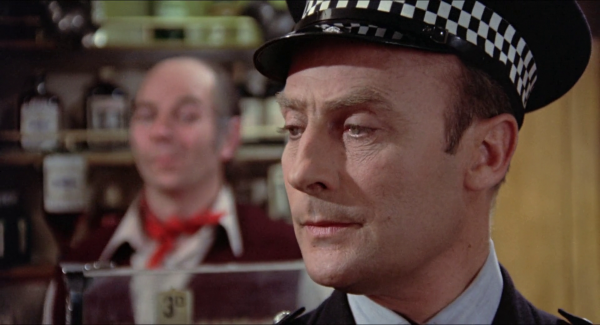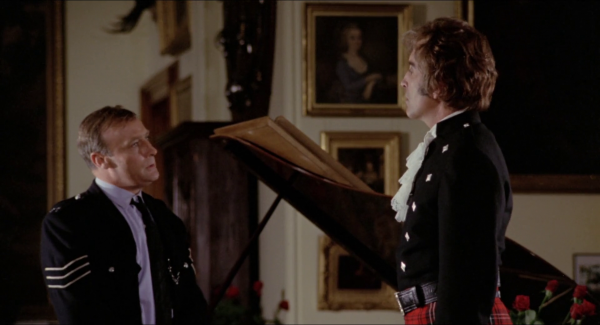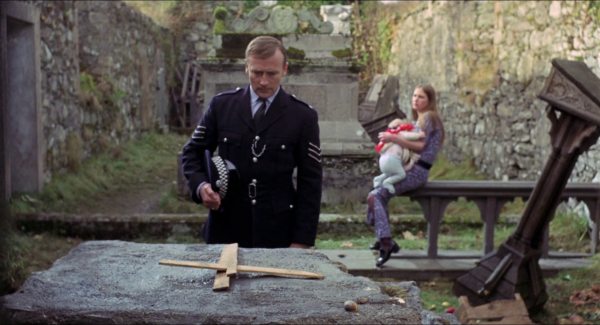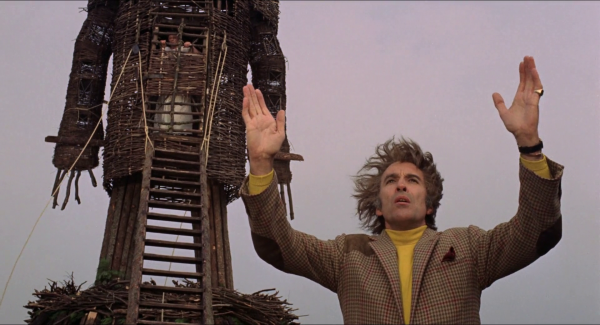The Wicker Man
It’s Halloween night (well, in my time zone, which is the only one that matters anyway), and when I think of Halloween, I think of Christopher Lee. I imagine that most readers will be aware that he made his name at Hammer Studios, starring in films like their Dracula series or Rasputin: The Mad Monk, and though I certainly think he was great as both Rasputin and the second-most famous Dracula (following, of course, Bela Lugosi), the film that comes to my mind first is also the one that he considered to be best he’d ever been in, The Wicker Man.
Now, The Wicker Man appears, in my observation, to be fairly well-known among horror fans, but is semi-obscure to wider audiences and what name recognition it does have comes partly from the botched remake. With that in mind, I’ll begin by offering a few observations on the film as a whole with minimal spoilers, then move into more specific remarks. I’m doing that because this is a movie where it is best to go in without knowing the ending, which has two aspects. One is the resolution to the fate of the missing girl the protagonist is searching for, and the other is the very end. Even if you already know one, I’d recommend watching the film anyway without spoiling the other.
So, the premise of this film is a classic mystery setup. Scottish Police Sergeant Neil Howie (played by Edward Woodward) has received a message from the isolated island of Summerisle, stating that a girl by the name of Rowan Morrison has been missing for several months. When he arrives and begins asking the locals about the situation, he quickly finds two things. One is that, though everyone he speaks to claims not to know her, it’s soon apparent that the locals and Lord Summerisle (played by Lee), leader of the island, know more than they’re letting on. Though The Wicker Man is typically classified as a horror movie, most of it is more like a mystery or detective story; the horror elements, for the most part, are only clear in the last 1/4 or so.

The other notable thing about Summerisle is that the people there are pagans, practising a reconstructed version of the area’s old heathen religion. We don’t see much of this beside a May Day procession, a dance around a Maypole, and, uh, some people having sex in the open at night, as well as some touches here and there. The town’s chemist, for example, has a bunch of small animals preserved in jars where we’d expect a more typical assortment of drugs. Most of that is realistic enough, I think - a society’s religious ideas aren’t always expressed explicitly, but do colour everything they do in ways that are more obvious to outsiders, like the devoutly Christian Sgt. Howie. The extent of the film’s nudity and sexual content is gratuitous, but it does have a point because it’s the place where the contrast between Christianity and this reconstructed paganism are most obvious.
Sgt. Howie remains professional and mostly stoic throughout all this, but needless to say it does wear on him, and he clearly grows more frustrated as the story progresses, partly because of these pagan practices and partly because of the total lack of cooperation, and even outright lies, he has to work against in his investigation for the missing child. His attempts to carry himself and speak authoritatively meet with only mixed success; the residents don’t particularly respect the police, despite usually being outwardly polite, and it’s clear that Lord Summerisle is the ultimate authority there. In fact, the scenes of his conversations with Summerisle are shot in a way that makes him appear small, even considering that Lee was a tall man to begin with, with Summerisle clearly the one in charge.

A few more notes before I move on to spoilers. One is that, though The Wicker Man is a favourite of mine, it’s certainly not for everyone and it’s something that most people seem to either love or hate. Some folks find it rather slow-paced and are put off by the weirdness of it; I’ve even seen some people mention being bothered by all of the singing and folk music, which seems like an odd complaint to me. If you have any interest, though, aren’t too bothered by sexual content, and don’t need constant explosions to stay entertained, by all means give it a shot.
I should say that there are multiple versions of this film, but for most people it’s pretty easy: watch the version called the “final cut,” which is the default version on both the American and British blu-ray releases of the film. This is ninety-four minutes long, and contains most of the material intended by the director in the proper order. DVDs and perhaps some streaming services will have the eighty-eight minute theatrical release, a badly cut and edited version of the film made for its original release. Though still watchable, it cuts and rearranges enough that it’s certainly harder to follow and less enjoyable, so there’s no reason to watch it now aside from historical interest. Finally, there’s a ninety-nine minute director’s cut, not available in the United States but is on some British releases. This is the most complete, but due to the quality of some of the recovered footage is only available in standard definition. If you’re wondering why these versions exist, a simple web search or even the Wikipedia article can explain it.
For those who care, spoilers begin below this picture.

Alright, now that the scrubs are gone let’s talk a bit about the ending. One touch that I like is that the film is bookended by sacrifices. The film begins with Sgt. Howie at church, which isn’t in the theatrical version, and taking Communion, a re-presentation of Christ’s sacrifice at Calvary. Obviously the film ends with a pagan sacrifice, but Sgt. Howie is also a Christ figure, a perfect victim being sacrificed, in the pagans’ eyes, for their good. Why was he a perfect victim? Because like Christ he was innocent, he came to the place of sacrifice voluntarily, he was a representative of a king (or rather, the queen at that time, whereas Christ came from God the Father), he was a virgin, and was “king for a day” (of course, Christ is King for eternity, but the May Day procession in this analogy would represent Christ’s entry into Jerusalem on Palm Sunday). The parallels make this final scene all the more powerful, though it’s not necessarily obvious on a first viewing, especially in the theatrical version.
During the final scene there’s one line in particular that stands out to me, when Summerisle tells Sgt. Howie that he’s offering him something quite rare and valuable, “a martyr’s death.” Though most Western governments are anti-Christian to some extent, serious physical persecution hasn’t begun, so many of us don’t really know just how firm our faith is. The film doesn’t dwell on this, perhaps because it had already established Sgt. Howie as quite serious about his religion, but despite his obvious fear and dread I don’t get the sense that he would’ve apostatised to save himself.
One interesting question, which the film doesn’t go into because it’s beyond the scope of the story, is what will happen if the crops fail next year. The residents take their paganism seriously, but what about Lord Summerisle? My impression is that he does love paganism as he says his father did, but he’s also fully aware that his grandfather instituted these things for cynical purposes. It’s essentially just a noble lie, then, from Lord Summerisle’s perspective, and it would be interesting to see a take on just how long a noble lie can endure.
In any case, I’ll go ahead and leave this discussion off here for now. It’s Halloween, so go trick-or-treating if you have children, eat too much candy, and watch a Christopher Lee movie.
